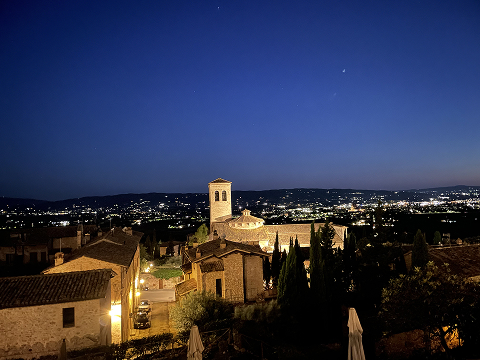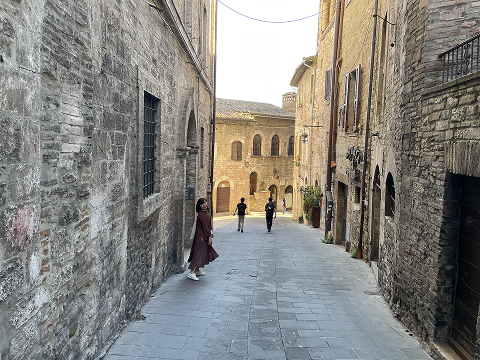2024 Italy-IARS
Jena-Assisi workshop report: Reflecting on identity development and reconciliation
July 2024
The University of Tokyo, Graduate School of Education PhD.Postdoctoral Researcher (JSPS)
The opportunity to participate in the reconciliation workshop in Jena and the International Association for Reconciliation Studies in Assisi as a member of the international reconciliation studies project of Waseda University provided me with extensive time to develop ideas on how we can contribute to reconciliation. I spent much of this time reflecting on the relationship between identity and reconciliation, as I conducted research on European educational efforts aimed at reconciliation through the development of European identity. This research was also the focus of my presentation at the conference.
The creators of the European Union, Robert Schuman, and Jean Monnet believed that Europe experienced two world wars because it defined national identity exclusively based on ethnicity. Bertrand Russell criticized all Western education between the two world wars for teaching false history and political science to instill loyalty to the state by creating “us” and “others” structure, thus causing conflict between nations and advocated for education that teaches human solidarity instead of loyalty to the state.
Since the 1950s, the Council of Europe has promoted international cooperation in the fields of education, art, and cultural heritage, intending to build a community with human rights and democracy as its identity foundation, as well as a reconciliation of the peoples of Europe. The European Union has also been actively engaged in educational cooperation since the inclusion of education as an area of cooperation in the Maastricht Treaty. Currently, there are several educational initiatives aimed at fostering European identity. These initiatives include the establishment of regional higher education institutions such as the College of Europe and the European University Institute, as well as the promotion of exchange programs like the Erasmus program.
To gain insights into how these initiatives develop identities, I conducted interviews with 26 Europeans who participated in both the Erasmus exchange program and the regional higher education institution (College of Europe). The data analysis revealed several findings, and among them, I introduced three: 1) As a result of regional educational experiences, students developed multilayered identities, both regional and national identities; 2) regional identity can be developed through cultural and/or political experiences; and 3) different regional educational initiatives have different approaches for developing regional identity. Exchange programs develop regional identity through cultural experiences more, whereas the College of Europe (regional higher education institution) develops students’ identity through shared political vision.
These educational initiatives surely contribute to creating a new collective identity, a regional identity. However, the question of whether developing a collective identity means that they have reconciled remains underdeveloped. I intend to investigate and conceptualize the connection between identity development and reconciliation in my future research.
Later at the conference, I attended a discussion session on identity-based reconciliation, where I also shared my experience working on a peacebuilding project in Sri Lanka. We explored how our identities are multilayered and how linking identity to reconciliation is a complex process.
In many post-conflict contexts, developing collective identity “national identity” has been used as a focal point for reconciliation efforts, as it is expected to unite people by sharing national historical narratives and social and economic development goals. However, during the discussion, it was pointed out that focusing solely on one type of identity for reconciliation may hinder addressing and reflecting the needs of other identities, such as gender, age, and ability, which are also deeply affected by conflict. We concluded that every conflict and war is unique, and the ways in which different identities are impacted also vary depending on the national and regional context. Therefore, it is crucial to be mindful of the complexities of identities in the reconciliation process.

My interest in the relationship between identity and reconciliation began when I worked as a United Nations Volunteer in Sri Lanka. As a Youth Engagement Officer, I was involved in a peacebuilding project aimed at promoting youth participation in peacebuilding processes. Sri Lanka is a multi-ethnic and multi-religious country that has experienced 26 years of conflict. Almost everyone I met had a strong identity as either Tamil, Sinhalese or Moors, rather than as Sri Lankan. Since Sinhalese and Tamils geographically live in different parts of Sri Lanka, my role was to bring and connect youth from different backgrounds to work towards the same goal: peacebuilding.
In one of the workshops we organized, we asked youth to identify a common problem in their community and design a project to address it. These projects were then evaluated, and funding was provided for those that were approved. Our aim was to connect youth from different ethnic and religious backgrounds to work together towards a common goal. We hoped that, through this process, they would exchange views, gain a better understanding of each other, and unite as one “us”—Sri Lankan. While I believe these workshops were successful, I also faced numerous challenges in facilitating them, which I will not detail here. The Jena workshop and the IARS conference gave me an opportunity to reflect on the project I was involved in 6 years ago and reconsider the process and challenges I faced, academically.
Reconciliation often requires different groups to share their narratives and listen to each other’s experiences, which can lead to a more inclusive understanding of history and foster mutual understanding. European initiatives and other educational programs aimed at building peace operate on a similar theory. However, it is not always straightforward; efforts can worsen the situation if the appropriate environment is not provided. The experience can either hinder or facilitate reconciliation, depending on the situation and the environment.
The European example of fostering a regional identity through educational initiatives highlights the potential for education to contribute to reconciliation. Yet, it also showed the need for ongoing research and efforts to understand the connection between identity development and reconciliation fully. Building on the discussions I had during the workshop and the conference with other participants, I intend to conduct fieldwork in South Asia to examine the impact of the educational initiatives in the region on reconciliation efforts.


